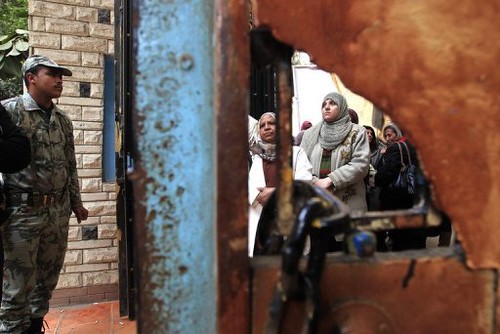
Egyptians went to the polls again on December 14, 2011 in the continuing phased elections for a new parliament. The elections have scored tremendous victories for the Islamist parties., a photo by Pan-African News Wire File Photos on Flickr.
Egyptians head to polls again in landmark election
(AFP) – CAIRO — Egyptians were headed to the polls again on Thursday in a phased election to choose the first post-revolution parliament, as liberals faced an uphill battle to compete with Islamist parties.
Ten months after a popular uprising ended Hosni Mubarak's 30-year rule, the country's new political landscape looks set to be dominated by Islamist parties which clinched two thirds of the votes in the opening stage of the election.
Polling stations are due to open at 8:00 am (0600 GMT) in a third of the country's 27 provinces.
Voters are required to cast three ballots: two for individual candidates and one for a party or coalition, in the assembly's 498 seats. The ruling military council which took power when Mubarak was ousted in February will nominate a further 10 deputies.
The second round of the three-stage polls takes place in Cairo's twin city of Giza; Beni Sueif south of the capital; the Nile Delta provinces of Menufiya, Sharqiya and Beheira; the canal cities of Ismailiya and Suez and the southern cities Sohag and Aswan.
Balloting began on Wednesday with a "large voter turnout," said Hamdi Badeen, a member of the ruling council.
Parties affiliated with the Muslim Brotherhood and the ultra-conservative Salafi movements won 65 percent of all votes in the first phase, trouncing liberal parties which managed 29.3 percent.
"We tried the liberals and the secularists and they did nothing for us," said one voter, Mohammed Rashad, on Wednesday, referring to Mubarak's party. "The Islamists have God's law."
The Muslim Brotherhood had been widely forecast to triumph as the country's most organised political group, well known after decades of charitable work and its endurance through repeated crackdowns by the Mubarak regime.
But the good showing from Salafist groups was a surprise, raising fears of a more conservative and overtly religious 498-member new parliament.
The Muslim Brotherhood has been at pains to stress its commitment to multi-party democracy, inclusiveness and civil liberties, while also advocating the application of sharia Islamic law.
Nevertheless, the prospect of an Islamist-dominated parliament raises fears among liberals about religious freedom in a country with the Middle East's largest Christian minority.
Much remains unclear about how the new parliament will function and whether it will be able to resolve a stand-off with the armed forces over how much power they will retain under a new constitution to be written next year.
After the voting for the lower house of parliament, which will end in January, Egyptians will then elect an upper house in a further three rounds of polls.
No comments:
Post a Comment